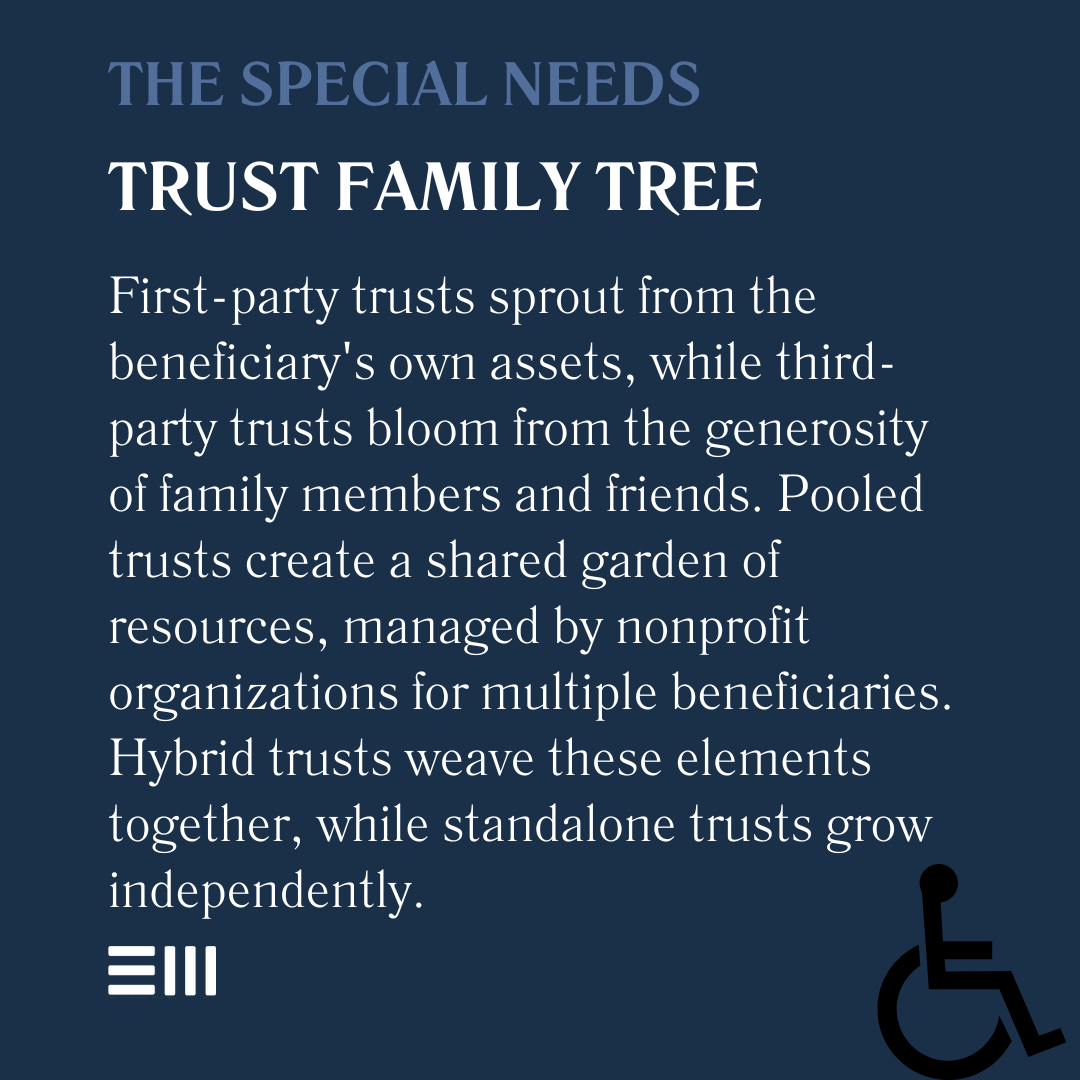Imagine providing your loved one with the best possible care while preserving their essential benefits.
For families across Alabama, Special Needs Trusts open doors to enhanced quality of life—funding specialized therapies, adaptive equipment, and enriching experiences—all while maintaining vital government assistance.
These carefully crafted legal tools transform the seemingly impossible balance between financial support and benefit eligibility into an achievable reality.
Understanding Special Needs Trusts
Special Needs Trusts serve as powerful tools for enhancing the lives of individuals with disabilities. They create a bridge between providing additional support and maintaining essential government benefits.
Types of Special Needs Trusts
Alabama recognizes several types of Special Needs Trusts, each designed to meet specific situations and needs. Understanding these options helps families choose the most appropriate structure.
- First-Party Special Needs Trusts: Created with beneficiary's own assets;
- Third-Party Special Needs Trusts: Funded by family members or others;
- Pooled Special Needs Trusts: Managed by nonprofit organizations;
- Hybrid Trusts: Combining multiple trust features; and
- Standalone Trusts: Individual trusts managed separately.
Each type offers unique advantages and considerations for different circumstances. Careful evaluation helps determine the best fit for your situation.
Benefits Preservation
Special Needs Trusts help maintain eligibility for essential government programs.
Understanding benefit preservation ensures proper trust structure and management.
- Medicaid Eligibility: Maintaining healthcare coverage;
- SSI Benefits: Preserving monthly income;
- Housing Assistance: Keeping housing support;
- Food Benefits: Maintaining nutritional assistance; and
- Medicare Coverage: Protecting healthcare options.
Proper trust structure protects these vital benefits. Regular review ensures continued compliance.
Trust Funding and Management
Successful Special Needs Trusts require careful attention to funding sources and management strategies. Understanding these aspects helps ensure trust effectiveness.
Acceptable Funding Sources
Special Needs Trusts can accept various types of assets. Knowing funding options helps in trust planning and management.
- Monetary Gifts: Cash contributions from family;
- Inheritance: Estate distributions;
- Legal Settlements: Personal injury or other claims;
- Life Insurance: Policy proceeds; and
- Property: Real estate or personal property.
Proper funding ensures trust effectiveness. Regular review maintains adequate resources.
Trust Administration
Effective trust administration requires attention to specific requirements. Understanding these duties helps ensure proper trust operation.
- Distribution Management: Proper spending decisions;
- Record Keeping: Detailed financial documentation;
- Tax Compliance: Meeting tax obligations;
- Benefit Coordination: Working with government programs; and
- Investment Management: Prudent asset handling.
Careful administration protects trust benefits. Professional guidance ensures compliance.
Permitted Expenditures
Special Needs Trusts can fund various expenses that enhance quality of life.
Understanding permitted uses helps maximize trust benefits.
Common Trust Uses
Special Needs Trusts can cover many expenses that government benefits don't. Knowledge of permitted uses helps in trust planning.
- Medical Care: Supplemental healthcare services;
- Education: Learning opportunities and materials;
- Recreation: Entertainment and activities;
- Personal Care: Additional support services; and
- Quality of Life: Life-enhancing purchases.
These expenditures improve beneficiary well-being. Regular review ensures appropriate use.
Prohibited Expenditures
Understanding restricted uses prevents benefit disruption. Clear guidelines help maintain program eligibility.
- Cash Payments: Direct money to beneficiary;
- Food: Regular grocery expenses;
- Shelter: Basic housing costs;
- Utilities: Standard household services; and
- Basic Necessities: Items covered by benefits.
Avoiding prohibited expenditures protects benefits. Professional guidance helps navigate restrictions.
Trust Planning Considerations
Effective Special Needs Trust planning requires attention to various factors. Understanding these elements helps create appropriate trust structures.
Future Planning
Long-term planning ensures trust effectiveness. Consideration of future needs helps in trust design.
- Life Expectancy: Planning for long-term care;
- Medical Needs: Anticipating health requirements;
- Living Arrangements: Future housing considerations;
- Support Systems: Family and professional care; and
- Financial Projects: Long-term funding needs.
Thorough planning improves trust effectiveness. Regular review allows necessary adjustments.
Recent Legal Developments
Alabama's legal landscape for Special Needs Trusts continues to evolve. Understanding recent changes helps ensure trust effectiveness and compliance with current law.
Legislative Updates
Recent changes in state and federal law affect Special Needs Trust planning and administration.
Staying informed of these developments ensures optimal trust performance.
- ABLE Account Integration: Coordination with new savings options;
- Distribution Rules: Updated guidelines for expenditures;
- Trustee Requirements: Enhanced fiduciary standards;
- Reporting Obligations: Modified documentation requirements; and
- Digital Asset Management: New rules for electronic accounts.
These changes shape trust planning and administration. Regular review ensures continued compliance.
Court Decisions
Recent court rulings influence Special Needs Trust interpretation and administration.
Understanding these decisions helps guide trust planning and management.
- Benefit Eligibility: Refined standards for qualification;
- Trust Language: Clarified requirements for provisions;
- Trustee Duties: Enhanced understanding of obligations;
- Distribution Standards: Updated interpretation of rules; and
- Administrative Requirements: Clarified procedures.
Court decisions guide trust practice. Professional guidance helps apply current standards.
Coordination With Other Planning Tools
Special Needs Trusts work best as part of a comprehensive planning strategy. Understanding how these trusts interact with other tools maximizes their effectiveness.
Estate Planning Integration
Special Needs Trusts should coordinate with other estate planning documents. Proper integration ensures comprehensive protection.
- Will Provisions: Proper funding directions;
- Power of Attorney: Authority for trust matters;
- Healthcare Directives: Medical decision coordination;
- Life Insurance: Beneficiary designation planning; and
- Property Ownership: Title coordination.
Coordinated planning improves outcomes. Regular review maintains effectiveness.
Professional Team Coordination
Successful Special Needs Trust planning often requires multiple professionals. Understanding team roles improves planning outcomes.
- Attorney: Legal structure and compliance;
- Financial Advisor: Investment management;
- Accountant: Tax planning and reporting;
- Care Manager: Needs assessment; and
- Benefits Specialist: Program coordination.
Team coordination enhances trust effectiveness. Regular communication improves outcomes.
Frequently Asked Questions About Special Needs Trusts in Alabama
Understanding Special Needs Trusts in Alabama raises important questions.
These answers address common concerns about establishing and managing these trusts in Alabama.
How Do Special Needs Trusts Affect Government Benefits?
Properly structured trusts preserve benefit eligibility while providing supplemental support for enhanced quality of life.
Who Can Serve as Trustee?
Family members, professionals, or organizations can serve, though expertise in Special Needs Trust administration is vital.
When Should We Establish a Special Needs Trust?
Early planning provides maximum benefit, though trusts can be established at any time before the beneficiary turns 65.
What Happens to Trust Assets After the Beneficiary's Death?
Distribution depends on trust type - first-party trusts require Medicaid reimbursement, while third-party trusts can distribute to other beneficiaries.
Can Multiple Family Members Contribute to the Trust?
Yes, third-party Special Needs Trusts can accept contributions from various family members and sources.
How Are Trust Assets Invested?
Trustees must follow prudent investor rules while considering the beneficiary's long-term needs and circumstances.
Secure Their Future Today
Your loved one deserves the enhanced quality of life that a Special Needs Trust can provide while preserving essential benefits.
Our experienced team understands the complexities of Special Needs Trust planning in Alabama and can help create a structure that meets your family's unique needs.
Contact us today for a confidential consultation. We'll help you understand your options and develop a plan that protects your loved one's future.


